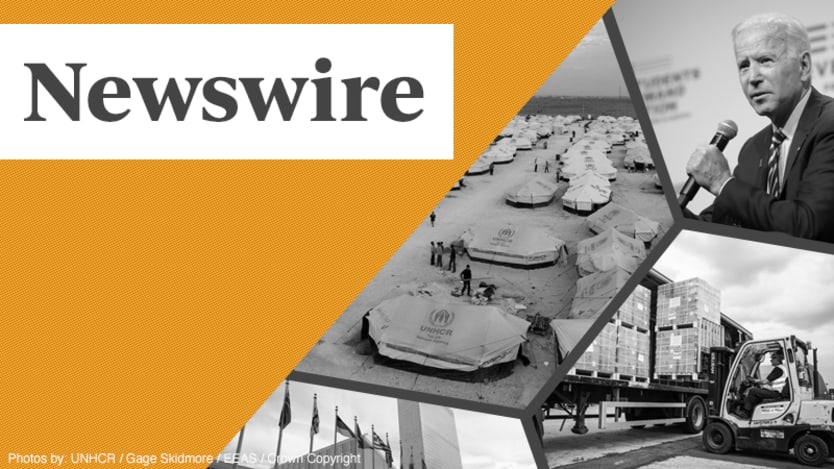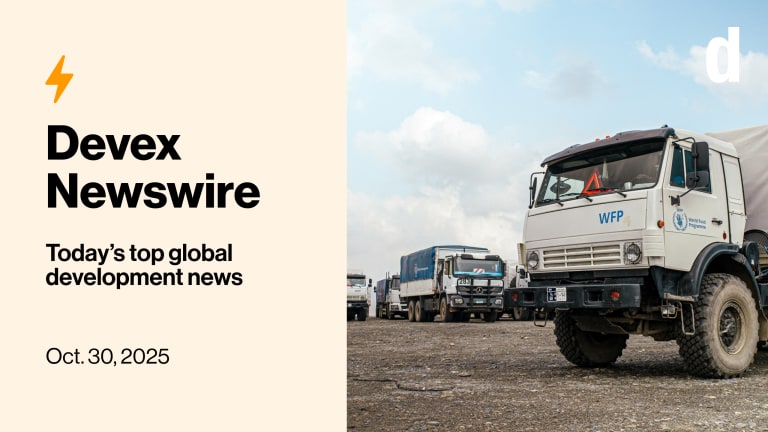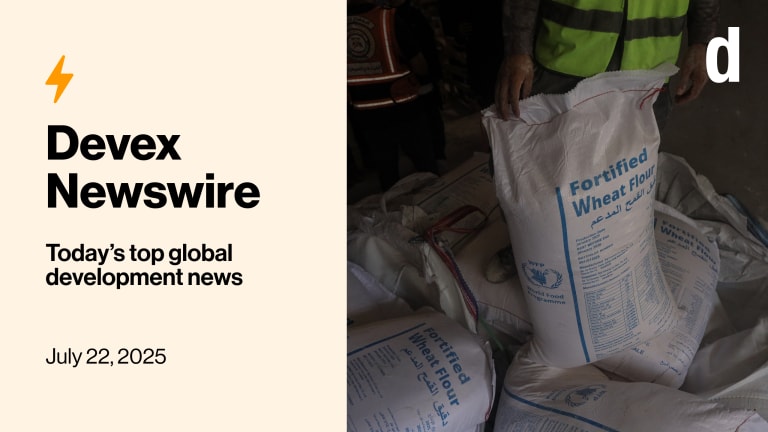Presented by World Food Program USA

As usual, the fallout from a global crisis is hurting the most vulnerable. But some aid agencies are so busy tackling food insecurity and making sure a staple diet gets to the people who need it that work on issues such as gender-based violence isn’t receiving the required attention, one expert tells Devex.
This is a preview of Newswire
Sign up to this newsletter for an inside look at the biggest stories in global development, in your inbox daily.
Also in today’s edition: The grain ship that left Ukraine last month arrives in Syria — not where it should be under the terms of the U.N.-brokered deal. And we shine a harsh light on abortion in Ethiopia.
The global food crisis has pushed the price of a cut of meat or loaf of bread beyond the reach of hundreds of millions of people, worsening child malnutrition and turning food into “a weapon of war.” But what about the collateral damage?
As aid organizations in Africa pivot their focus to alleviating hunger, some are stretched so thin that they struggle to tackle other pressing issues.
Parvin Ngala, Oxfam GB’s director for the Horn, East, and Central Africa, explains to Devex contributing reporter Sophie Edwards how food insecurity, famine, and drought have hindered crucial work around women’s economic empowerment and unpaid care, creating an aid gap that drives sexual violence and child marriage.
Initiatives directly related to women have suffered as attention is aimed at providing food, she says. On top of that, violence is worsening because women must trek further to find water, she adds, and girls are being “married off because families are struggling with getting resources.”
After almost six months of war in Ukraine, food is just getting scarcer, and price hikes for fuel and fertilizer will only “exacerbate an already dire situation,” Ngala warns.
Q&A: Oxfam pivots to tackle the food crisis in Africa (Pro)
+ This Q&A is the first in a Devex Pro series on how organizations are responding to the global food crisis. Start your free 15-day trial of Devex Pro to read this piece and access essential analysis, data-driven funding insights, and the world’s largest global development job board.
Grain drain
Some of Oxfam GB’s concerns could be alleviated if food, especially grain from Ukraine, was getting to global markets and reducing costs in the places hardest hit. So there was a global sigh of relief when a deal was inked last month to allow some much-needed grain to leave ports in Ukraine, though food-price inflation worldwide is still frighteningly high, and food commodity markets are volatile.
The World Bank released its update on food inflation this week, and my colleague Shabtai Gold reports that the multilateral lender remains “cautious” about the cargo ship agreement between Russia, Turkey, and Ukraine.
Caution appears to be wise. The first vessel that pulled out of port in Odesa under the United Nations-brokered deal has docked in Syria, a key ally of Russia, according to satellite photos published by the FT. It’s not supposed to be there.
The Razoni offered hope when it left the Black Sea port carrying over 26,000 metric tons of corn to Lebanon, which is suffering from 122% food inflation, the highest in the world. But the vessel is now tethered at the port of Tartus in Syria, the site of a Russian naval base, and unloading, according to Reuters, which doesn’t bode well for the deal.
Meanwhile, Shabtai is keeping tabs on another vessel that left Ukraine last week as part of a World Food Programme effort to deliver wheat to countries in need. We’ll see where that ends up.
World Bank: Food uncertainty rife, prices high even after Ukraine deal
Devex Dish: Will the Ukraine grain deal solve the food crisis?
Decisive shift
Research from 1980 to 1999 found unsafe abortions were responsible for a third of maternal deaths in Ethiopia, where women used umbrella wire and other horrific implements to terminate their pregnancies. My colleague Sara Jerving has an in-depth account of Ethiopia’s shift from brutal backstreet terminations to today’s much safer reality now that abortions are legal in more cases: In 2016, just 1% of the country’s maternal deaths were due to unsafe abortion.
Sara talks to Dr. Muir Kassa, an obstetrician-gynecologist and senior technical adviser to the country’s health minister, who described how delivery rooms were overwhelmed as doctors battled to save women who had undergone “unimaginable” abortions — and such patients occupied half of all hospital beds. But health professionals are anxious that the United States Supreme Court's decision to overturn Roe v. Wade could cause similar U-turns in other countries.
Read: Ethiopia expanded access to abortions and it saved lives
Read more: Bracing for global impact as Roe v. Wade abortion decision overturned
+ For more content like this, sign up to Devex CheckUp, our free, must-read newsletter that keeps you up to date with all the front-line and behind-the-scenes reporting on global health.
Tough jobs for tough days
As the world lurches from crisis to crisis, it needs leaders who can sit in the hot seat, handle the fallout, and make calm decisions. Hopefully two big appointments this week can do that.
Simon Stiell was named executive secretary of the United Nations Framework Convention on Climate Change, succeeding Patricia Espinosa, who last month ended her six-year term. Stiell, who is from Grenada, has a tough job ahead of him — not just tackling climate change, but also navigating the tricky political climate at the 27th U.N. Climate Change Conference in Egypt later this year, where Russia’s invasion of Ukraine has ruptured international relationships.
Meanwhile, USAID chief Samantha Power swore in Amy Tohill-Stull as mission director for the West Bank and Gaza. Power praised the new appointee’s “unrelenting commitment and persistence” but noted that she also takes the job at a difficult time. Just days after Tohill-Stull got to the region, 40 Palestinians were killed and hundreds were wounded in clashes in Gaza and Israel.
+ Pro members can read our monthly roundup of global development job moves.
In other news
Two police escorts of a polio vaccination team died after gunmen opened fire on them in northwest Pakistan. [BBC]
UNICEF has awarded pharmaceutical company GSK a $170 million contract to produce 18 million doses of the world’s first malaria vaccine. [UN News]
The U.S. announced Tuesday that it will provide $68 million in additional funding to WFP to buy up to 150,000 metric tons of Ukrainian wheat to deliver to populations facing food crises. [USAID]
Sign up to Newswire for an inside look at the biggest stories in global development.








